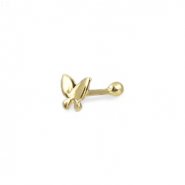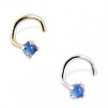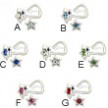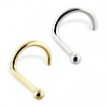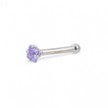14K Real Yellow Gold Butterfly Nose Bone, 20 Ga
- Length: 1/4" (6mm)
- Gauge (Thickness): 20 (0.8mm)
- Material: 14K yellow gold
- Type: nose bone
| Click on the picture to see a big picture and description of the body jewelry you are interested in. | |||||||||
|---|---|---|---|---|---|---|---|---|---|
|
14K Gold Nose Screw with 2mm...
$29.99
14K Gold Nose Screw with 2mm Round Cabochon Blue Onyx
|
Sterling silver nose screw with jeweled...
$3.99
Sterling silver nose screw with jeweled star, 20 ga
|
14K Gold Nose Screw with Ball...
$24.54
14K Gold Nose Screw with Ball tip
|
14K White Gold Nose Bone With...
$13.99
14K White Gold Nose Bone With Amethyst Square Gem, 20 Ga
|
||||||
Captive Bead Ring
The basic ring design is the captive bead ring, or ball closure ring. The bead is not attached to the ring; the tension of the ring holds the bead captive. Factors which affect how tightly the bead is held in place are how annealed (soft) the ring is, how deeply the bead is bored, and the relationship between the gauge and diameter of the ring. In the case of captive bead rings in small diameters or thicker gauges ring expanding pliers may be required to release the bead. The ends should be well-rounded for easier insertion. Captive Bead Rings (CBR) are referred to as Bead Closure Rings in the UK.
Variations on the standard captive bead ring include:
Flat-Tipped: The ends are flattened horizontally, making the ends tapered and pointed. The ring appears to be able to stand-up when the bead is removed. While this design makes insertion and stretching easier (no taper needed), it is not suitable for most new piercings where the thinner section cannot be prevented from rotating into the piercing. Flat-tipped rings may also be uncomfortable in some areas, depending on the cut and angle of the horizontal edge.
Asymmetrical Teardrop / Navel Ring: Designed specifically as a less extruding piece of jewelry for the navel piercing; a teardrop-shaped ring in which the opening is on one side rather than at the bottom. This design takes some practice to manipulate.
Teardrop Ring: A symmetrical upside-down teardrop, where the opening is at the narrowest point. When sizing, the width of the ring is most significant, and standard sizing guidelines should be followed using this measurement.
Ball and Socket Ring: The same appearance as a standard CBR, with the convex/concave orientations reversed; the ring ends are concave to hold a solid bead. This design only works with rings of 8ga and larger.
Large gauge ring (10ga +) with bevelled ends: The ends bevelled vertically to fit perfectly into the bore of the bead; the bead is bored or dimpled to match the gauge of the ring. The ring has the appearance of passing through a hole in the bead; the rings ends are not visible with no gaps. Bevelling the ends in this way also reduces how far the ring must be opened to release and replace the bead. This design does not prevent smooth insertion.
Other designs include tapered teardrops (the upper half of the ring is the full gauge), symmetrical oval, and rings in various shapes.
Counter-bored and dimpled beads are best suited for most gauges. Stone beads are usually drilled all the way through; the entrances should be bored a bit wider to accommodate the gauge of the ring. Steel beads are often dimpled to the appropriate depth for the gauge of the ring rather than drilled all the way through.
Rings can be fitted with a wide assortment of beads. Cubes, skulls, hearts, coils, and tubes in a variety of metals are just a few of the options. Decorative sterling silver beads are usually too heavy to be worn on a new piercing. Silver beads can irritate a piercing if the bead is in contact with the piercing. Silver beads should not be worn with genital piercings; urine will oxidize the metal.
Soft stones such as tigers eye, malachite, lapis, turquoise, or jaspers should not be worn in genital piercings or new piercings because urine and piercing secretions can erode the stone. Malachite, turquoise, and lapis can leach copper in these envoronments. Porous stones trap bacteria. Lesser grades of brittle stones which are easily chipped should be avoided.
